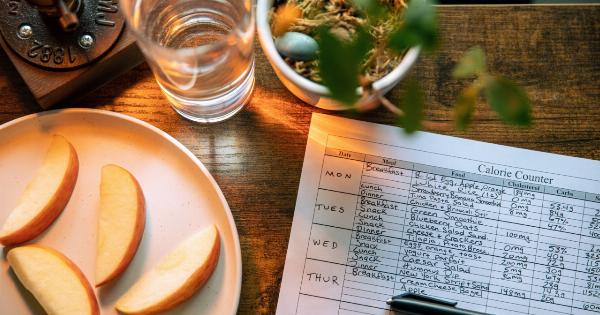When it comes to achieving our health and fitness goals, keeping track of our caloric intake is often an essential part of the process.
Whether we aim to lose weight, gain muscle, or simply maintain our current physique, accurately calculating our calorie needs can make a significant difference in the outcome. However, many individuals unknowingly make mistakes in their calorie calculations, leading to inaccurate results that can hinder their progress.
In this article, we will explore some of the most common misconceptions and errors individuals make when calculating their calorie needs.
1. Underestimating Portion Sizes
One of the primary mistakes people make when calculating their calorie intake is underestimating the portion sizes of the foods they consume.
It is easy to overlook the actual amount of food we consume, especially when it comes to snacks or items that don’t have specific serving sizes. This leads to underestimating the calorie content and ultimately consuming more than anticipated.
2. Neglecting Condiments and Sauces
While we may be mindful of the main components of our meals, it is common to ignore the additional calories that come from condiments, sauces, and dressings. These extras can significantly impact our overall calorie intake.
For instance, a seemingly healthy salad can turn into a high-calorie meal when drenched in creamy dressings or loaded with excessive amounts of oil.
3. Overestimating Calorie Expenditure Through Exercise
Many individuals mistakenly believe that they can consume extra calories based on their exercise routine alone, leading to overestimating their calorie expenditure.
While exercise is undoubtedly beneficial for overall health and can contribute to weight management, it is crucial to remember that the calorie burn during exercise is often lower than we anticipate. Relying solely on exercise to justify overeating can hinder progress towards our goals.
4. Failing to Account for Basal Metabolic Rate (BMR)
Our Basal Metabolic Rate (BMR) is the number of calories our body requires to maintain essential bodily functions at rest. It is vital to consider our BMR when calculating calorie needs accurately.
Ignoring this factor can result in an excessive or insufficient caloric intake, depending on the goal. Underestimating the BMR can hinder weight loss efforts, while overestimating it may lead to unwanted weight gain.
5. Not Adjusting Caloric Intake Over Time
Our bodies are not static, and our calorie needs can change over time due to factors such as changes in weight, body composition, and activity level. Failing to adjust our caloric intake accordingly can hinder progress towards our goals.
Regular monitoring and recalculating our calorie needs are necessary to ensure an appropriate intake for our current circumstances.
6. Relying on Generic Calorie Calculators
Generic online calorie calculators can be a helpful starting point, but they are not always accurate for everyone.
These calculators often provide estimations based on averages and general population data, failing to take into account individual differences such as metabolic rate, body composition, and specific health conditions. Consulting with a registered dietitian or nutritionist can provide a more personalized and accurate calculation.
7. Disregarding Hidden Calories in Beverages
While it is common to focus on the calories in our meals, many people overlook the significant calorie content found in beverages. Sodas, fruit juices, alcoholic beverages, and even some seemingly healthy smoothies can pack a significant caloric punch.
Being mindful of our beverage choices and opting for lower-calorie options or water can help prevent unintentional calorie overconsumption.
8. Failure to Track Snacking and Graze Eating
Oftentimes, we forget to account for snacking or grazing throughout the day. Those little bites here and there, such as a piece of chocolate or a handful of chips, can quickly add up and contribute to a significant increase in calorie intake.
Keeping a food diary or using a calorie tracking app can help track these seemingly insignificant nibbles and provide a more accurate calorie count.
9. Not Considering Individual Response and Adaptation
Each individual’s body responds differently to caloric intake and exercise. Some people may have a higher metabolic rate or be more sensitive to specific macronutrients.
Failing to consider these individual responses and adaptations can result in stagnant progress or frustration. Experimenting with different approaches and monitoring results can help tailor the calorie calculation to individual needs.
10. Overcompensating for Calorie Deficits
When aiming for weight loss, some individuals tend to overcompensate for calorie deficits, leading to a cyclical pattern of restrictive eating followed by overeating.
Restricting calories excessively can hinder progress and result in a slowed metabolism. Instead, aiming for a moderate and sustainable caloric deficit is essential for long-term success.



























